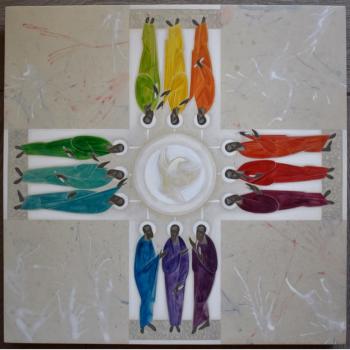**Recent Update: Apparently the leadership of Crossway, the publishing house of the ESV, has come to its senses. They’ve recently decided to change course and make the ESV translation not-so-permanent. They write this on their website:
In August 2016, we posted on our website that “the text of the ESV Bible will remain unchanged in all future editions printed and published by Crossway.”…We have become convinced that this decision was a mistake. We apologize for this and for any concern this has caused for readers of the ESV, and we want to explain what we now believe to be the way forward. Our desire, above all, is to do what is right before the Lord.
Our goal at Crossway remains as strong as ever to serve future generations with a stable ESV text. But the means to that goal, we now see, is not to establish a permanent text but rather to allow for ongoing periodic updating of the text to reflect the realities of biblical scholarship such as textual discoveries or changes in English over time. These kinds of updates will be minimal and infrequent, but fidelity to Scripture requires that we remain open in principle to such changes, as the Crossway Board of Directors and the ESV Translation Oversight Committee see fit in years ahead.
That’s good news. I’m happy they changed tack on what was a bizarre course.**
Crossway, the company that prints and publishes the English Standard Version (ESV) of the Bible recently announced a series of permanent changes to their translation of the Bible. This doesn’t happen every day but it’s not that noteworthy that slight adjustments have been made to a translation. What is noteworthy is their preemptive decision to freeze any further work on the translation, indicating that the updated 2016 edition (referred to as the “Permanent Text of the ESV Bible”) shall heretofore remain “unchanged throughout the life of the copyright, in perpetuity.”
My question is simply this: Why would they do that?
You can review a list of the changes here. As you’ll quickly see, many of the changes are relatively minor, though some have more theological significance. One example is the alteration of how Genesis 3:16 is translated.
Permanent Text: Your desire shall be contrary to your husband, but he shall rule over you.
Previous Text: Your desire shall be for your husband, and he shall rule over you.
However important this and other changes may be, the point of this post isn’t too dig into the significance of the translation (though it’s clearly making an interpretive decision for the reader that it doesn’t have to make). My point in writing and drawing your attention to the changes is simply to highlight what I think is an unnecessary, strange and quite possibly irresponsible move by Crossway.
Translations ought to change as archaeology and scholarship progresses. So, it’s not the changes per se that are unnecessary, strange or irresponsible. What is really troubling is the decision to freeze the translation of the ESV, ensuring it will remain “unchanged throughout the life of the copyright, in perpetuity.”
I find it especially odd to justify this decision by citing the King James Version (KJV) translation of the Bible, which has remained unchanged since 1769, as if this was a good precedent. Despite the historical (and sentimental) importance of the KJV, both in terms of feeding the church and in forming the English language more generally, it is simply a matter of fact that the KJV is not the best translation available. While the 1769 version of the KJV reflects improvements upon the original 1611 translation, it is still based upon older manuscripts than we currently have access to.
In Alistair McGrath’s book In the Beginning: The Story of the King James Bible, he unpacks the history and significance of this incredibly important text. Here’s an excerpt that explains why appealing to frozen translation of the KJV is a wonky thing to do:
In the sixteenth century [when the KJV was originally translated], the best editions of the Greek New Testament were based on manuscripts dating from no earlier than the tenth century. Since then, many new manuscripts have been discovered, of which the most famous is the Codex Sinaiticus, probably written in the fourth century. This was found in the monastery of St. Catherine on Mount Sinai in 1844, and is now held in the British Museum…A vast range of papyri have also been found. The result is that now we have access to a much more accurate edition of the text of the New Testament than the King James translators knew.
More modern translations of the Bible simply have the potential to be more accurate because their translators have older, more accurate editions of Greek manuscripts. The point here is that as archaeologists have uncovered older manuscripts and scholars have progressed in their understanding of biblical languages, our translations of the biblical text can improve. Now, it’s important to note that McGrath immediately follows this up by saying that while the KJV version was based on older manuscripts than we now have access to, this does not make it an unreliable translation. He writes:
It must be made clear immediately that this does not call into question the general reliability of the King James Bible. The issue concerns minor textual variations. Not a single teaching of the Christian faith is affected by these variations, not is any major historical aspect of the gospel narratives or early Christianity affected.
As with the KJV, which was subject to its translators’ various limitations, it should be said that the ESV remains a reliable translation of the biblical text, despite the various limitations of its translators. Nevertheless, the decision to halt any further work on the translation, proclaiming that it will remain unchanged in perpetuity is bizarre and suggests to me that Crossway believes the translation team has definitively just nailed it. I’m not sure if this is their intention, but this move by Crossway doesn’t communicate the best message. It’s almost as if they’re saying “we’ve got the final word, the conversation is over, our translation of the Hebrew, Aramaic and Greek texts cannot be improved upon.”
This seems unnecessary, strange and quite possibly irresponsible.











